10 Best Materials for Shower Walls
Choose from a range of shower wall materials to complete your renovation
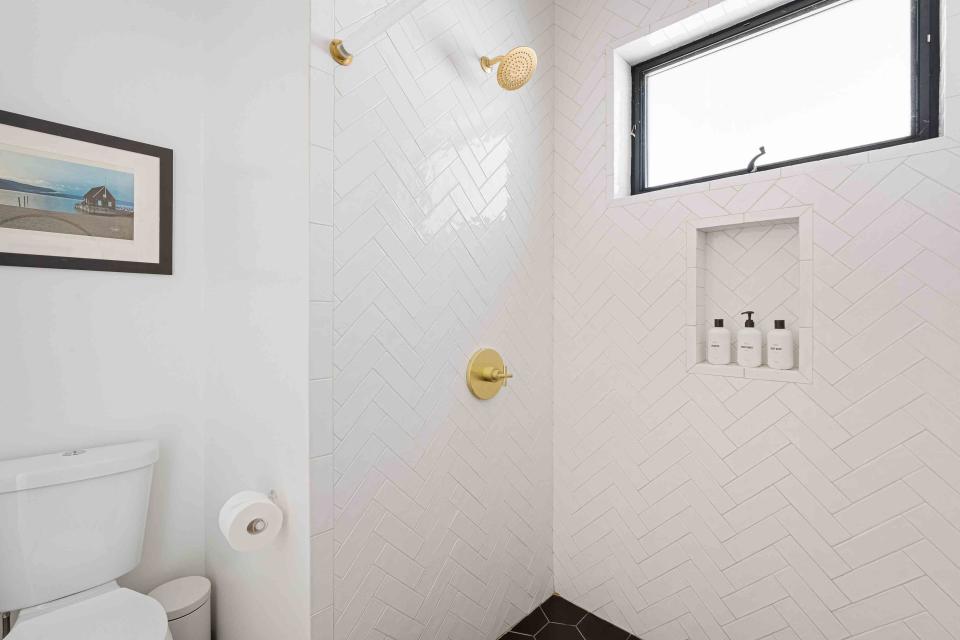
The Spruce / Alyssa Vela
Often taken for granted, shower walls serve an important purpose in the bathroom by keeping the moisture produced during a shower from seeping into the wood frames and drywall. To fulfill this purpose, it's necessary for shower wall material to be waterproof or at least water resistant.
Common shower wall materials include ceramic, porcelain, and acrylic, though there is a wide range of additional options to choose from depending on project budget, personal style, and maintenance requirements. Use this guide to the best materials for shower walls to find out more about these 10 shower wall materials, so you can make an informed decision for your bathroom.
The 11 Best Shower Kits of 2023
Granite
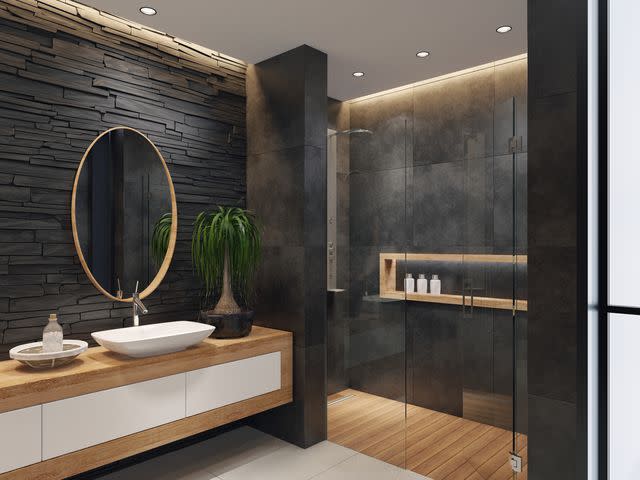
tulcarion / Getty Images
Best for: Durability, style, and stain-resistance.
An attractive option for almost any bathroom is granite. This natural stone tile comes in a range of colors and each tile has a unique pattern created by the natural formation of the granite. As a shower wall material, granite is heat-resistant, scratch-resistant, and stain-resistant, though the porous material is vulnerable to water.
This may seem like a big problem, given that the shower walls will constantly be wet, but if the granite is properly sealed prior to installation and regularly resealed about once every one to two years, the water won't be an issue. Despite the high level of durability, a primary drawback that could cause you to hesitate before installing granite in the shower is that it is one of the more costly shower wall materials available, so you will need to weigh the cost against the project budget.
Acrylic
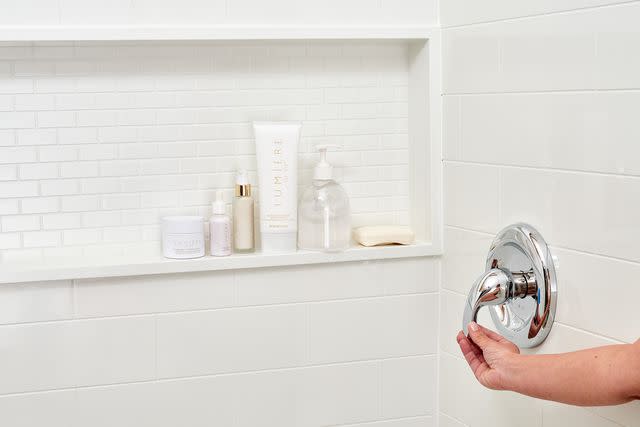
The Spruce / Kevin Norris
Best for: Designs, colors, textures, and mold-resistance.
Acrylic is a top option for the shower walls because it is relatively affordable, offers outstanding mold-resistance, and it is available in a wide assortment of colors, textures, and designs to meet just about any style. This material typically comes in one large piece or in several panels that can be installed by an experienced DIYer.
One factor to keep in mind if you are thinking about installing acrylic shower walls is that this material is vulnerable to abrasive damage and impact damage. Avoid scratching, cutting, or hitting the acrylic to prevent dents, cracks, and unsightly marks on the shower walls.
Natural Stone
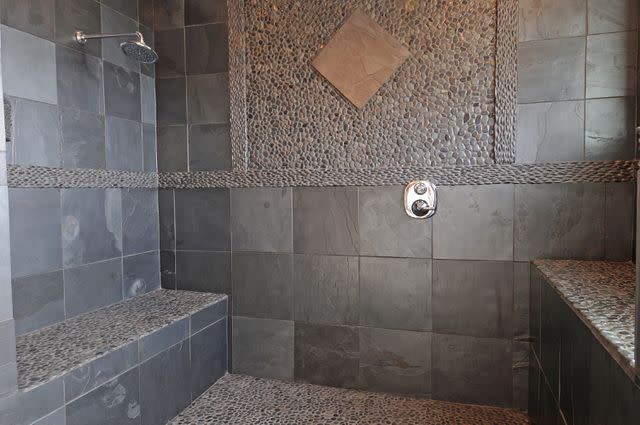
DigiStu / Getty Images
Best for: Long life, natural appearance, and durability.
Installing natural stone tile shower walls is an excellent way to make your bathroom stand out. Each tile has a unique pattern or design that is attributed to the formation of the stone, giving the shower walls a natural look that is difficult to replicate with less expensive options. However, for those that are concerned about the cost, it's also important to keep in mind that natural stone tiles can last for up to 25 years before needing to be replaced, as long as the shower walls are properly cleaned and maintained.
This material is durable and resistant to heat, abrasive damage, and impact damage. The drawback is that natural stone is porous, meaning that it is vulnerable to water and staining unless the tiles are sealed prior to installation and regularly resealed about once every one to two years.
PVC Laminate
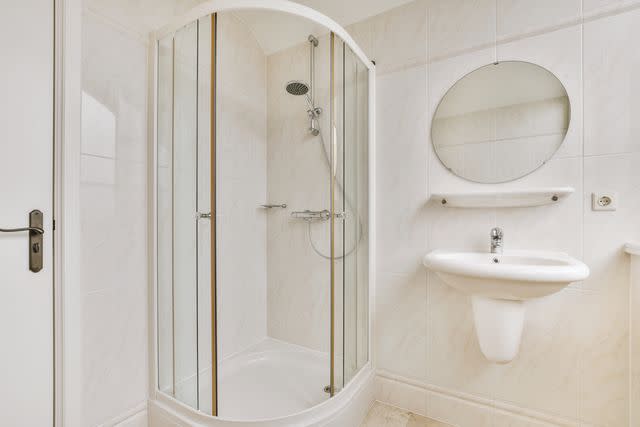
Gayrat Tolibov / Getty Images
Best for: Affordability, mold-resistance, colors, designs, and finishes.
Given that affordability is a key factor for many individuals that are trying to stay on budget during a bathroom renovation, PVC laminate is an excellent option. DIYers can choose from an assortment of colors, designs, and finishes that meet their personal style or the aesthetic of the home.
PVC laminate is a lightweight, affordable option that is relatively easy to install. While this material is resistant to heat, water, staining, and mold, it is vulnerable to abrasive damage. With this in mind, it's necessary to take care during and after installation to avoid scratching, cutting, or slicing the laminate.
Fiberglass
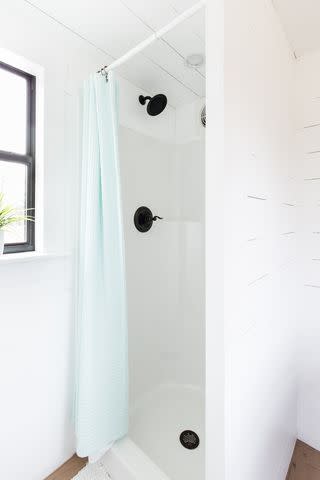
Tiny Life Construction
Best for: Durability, sound insulation, and mold-resistance.
In terms of durability and insulation, fiberglass is one of the top options for shower wall renovations. This material dampens sounds and reduces the transfer of heat through the wall, allowing users to soak in the warmth and privacy of the shower. Fiberglass is tough and resistant to cracking and dents, though it can still be damaged by scratches or cuts.
This material is also resistant against mold and mildew growth, making it easier to maintain and keep clean. Fiberglass shower walls generally come in a few bulky pieces that are relatively easy to install, so if the prospect of cutting ceramic, porcelain, or glass tiles is causing you to hesitate, it may be best to opt for fiberglass shower walls.
Marble
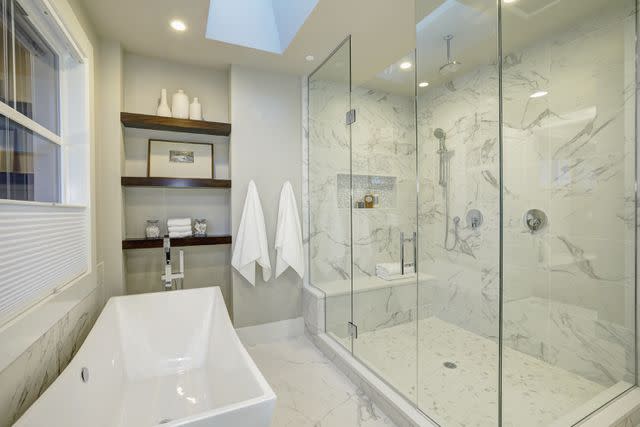
irina88w / Getty Images
Best for: High-end appearance, long lifespan, and durability.
Another natural stone option, marble has long been admired for the elegant appearance of the bright material and the unique designs created by iron veins running through the marble stone. Marble tiles don't just look great in the shower, they also last a significant amount of time before needing to be replaced, with some products lasting up to 25 years.
This material is lighter than granite, making it slightly easier to install, though the cost is about the same. Similar to granite and other natural stone materials, marble is porous, so it needs to be sealed prior to installation and regularly resealed about once every one to two years to protect it from moisture and staining. It also, necessary to mention that if marble is not properly handled, it can crack or chip.
Solid Surface
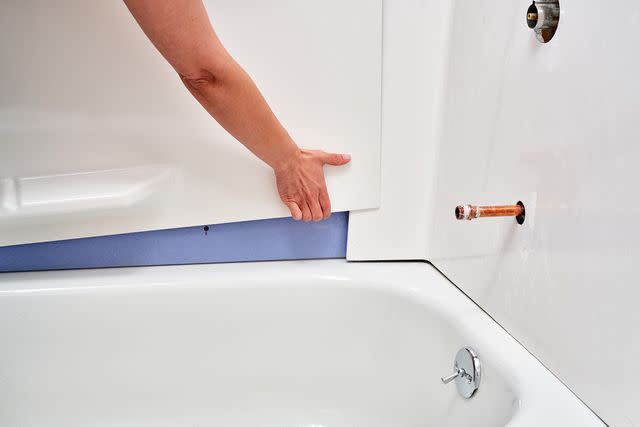
The Spruce / Kevin Norris
Best for: Affordability, custom fit, colors, and styles.
While many people may prefer high-end materials for the shower walls, solid surface panel kits are easy to assemble and install, saving money on materials and installation. Solid surface shower walls are affordable, mold-resistant, and available in a wide assortment of colors and styles.
This material can also be made to fit a custom space without a significant increase in price. Solid surface is easy to clean, requiring a wipe down about once every two weeks, though it should be noted that these shower walls are vulnerable to impact damage. Once dented or cracked, solid surface walls are difficult to repair, so users need to take care to avoid damaging the walls while using the shower.
Ceramic
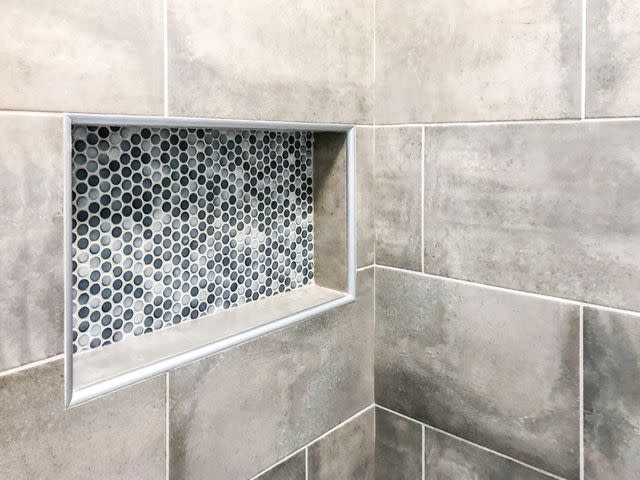
MultimediaDean / Getty Images
Best for: Colors, designs, stain-resistance, and easy cleaning.
One of the most common options for the shower walls is ceramic. This material comes in a wide range of designs, colors, and styles, so that the bathroom ends up looking the way you want, instead of having to settle for a design that doesn't match the bathroom aesthetic. Ceramic tiles are typically available in square or rectangular shapes, with a small assortment of sizes to choose from.
The material is resistant to stains and only needs to be cleaned about once a week to prevent mold and mildew from accumulating in the grout lines. However, ceramic is vulnerable to cracks, chips, and scratches, so you need to be careful when handling these tiles. It should also be noted that ceramic tiles can help complete a project on a tight budget because this material tends to be less costly to purchase and install than porcelain tiles.
Porcelain
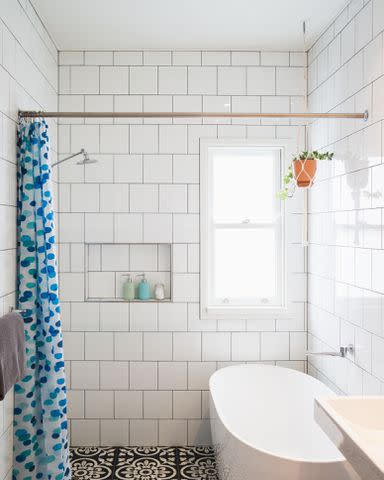
Turnervisual / Getty Images
Best for: Light maintenance, stain-resistance, and style options.
Porcelain tiles are known to have a higher level of durability and water-resistance than ceramic tiles, despite the similar appearance. While these tiles are vulnerable to chipping and cracking, porcelain is resistant to scratches, staining, and mold growth. DIYers and pros can find porcelain tiles in a variety of colors, designs, and styles, so you can create the ideal bathroom aesthetic according to your personal tastes.
Pair the color of the porcelain tiles with a complimentary or neutral grout color to improve the appearance of the bathroom. Just keep in mind that mold and mildew tends to gather in the grout lines, so it's important to clean the shower walls about once a week to avoid mold staining and to ensure the cleanliness of the bathroom.
Glass
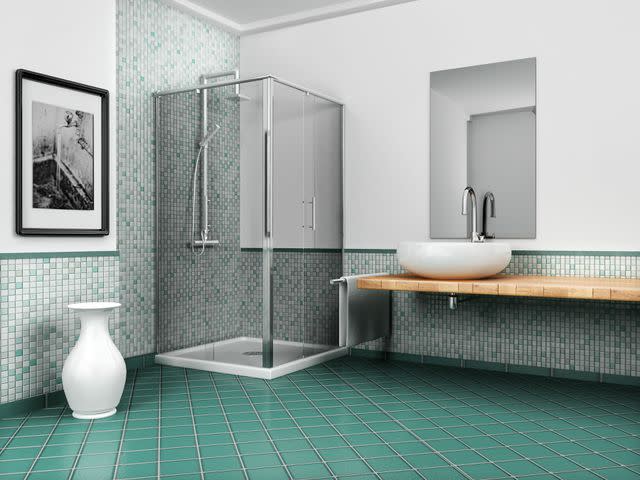
grafart / Getty Images
Best for: High-end aesthetics, mold-resistance, stain-resistance, and easy cleaning.
Glass tiles are an excellent option for the shower walls as long as the high cost is accounted for in the renovation budget. This material typically comes as plain square or rectangular tiles, but for those looking for a custom appeal, mosaic glass may be a good choice. Mosaic glass has all the same benefits of standard glass tiles, but it is available in a wide range of shapes and colors.
Glass as a shower wall material is easy to clean, resistant to mold and mildew growth, and it's resistant to stains because glass is a nonporous material. However, this material isn't resistant to cracks, chips, or scratches, so DIYers and professional installers need to take care while handling and installing glass shower walls.
Choosing a Shower Wall Material
With a range of options to choose from, it can be difficult to come to an agreement on the best material for the shower walls. To help narrow down your choices, consider the budget for the project, the style that you want for the bathroom, and the maintenance requirements for each type of material. Low budget options include solid surface, fiberglass, PVC laminate, and acrylic, while glass, marble, granite, and natural stone tiles are premium shower wall materials.
Marble, granite, and natural stone are porous materials that can be damaged by the water and moisture in a shower unless the tile is regularly sealed to prevent the water from seeping into the tile. For shower walls that are easy to keep clean, consider investing in porcelain, ceramic, PVC laminate, or even glass. Depending on the material, there is a wide variety of colors, patterns, tiles sizes, and shapes to complete the renovation project. Weigh the options carefully before choosing the best shower wall material for your home.

